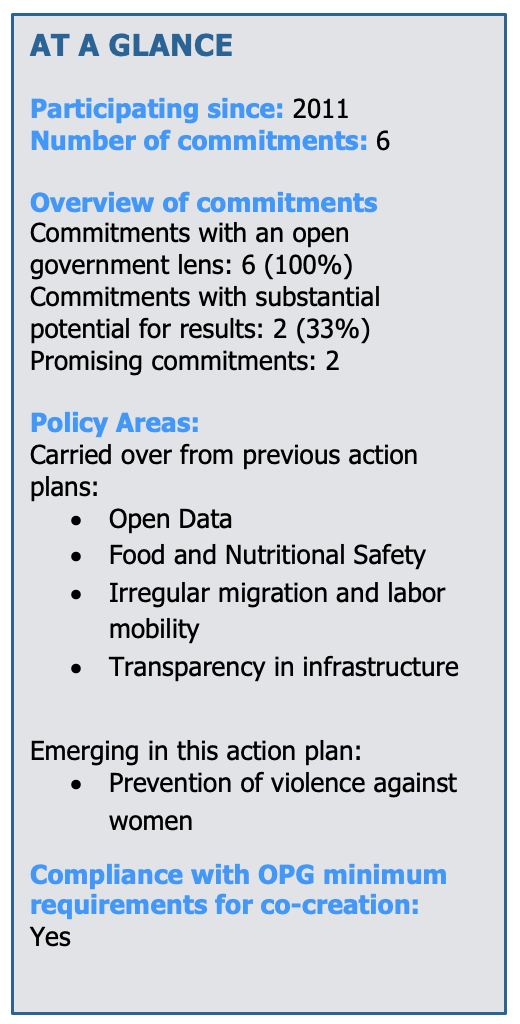Guatemala Action Plan Review 2023-2025
- Action Plan: Guatemala Action Plan 2023-2025
- Dates Under Review: 2023-2025
- Report Publication Year: 2024
In the context of Guatemala’s government transition, the sixth action planAction plans are at the core of a government’s participation in OGP. They are the product of a co-creation process in which government and civil society jointly develop commitments to open governmen... includes civil society initiatives to continue advancing in key policy areas, like open dataBy opening up data and making it sharable and reusable, governments can enable informed debate, better decision making, and the development of innovative new services. Technical specifications: Polici... and transparencyAccording to OGP’s Articles of Governance, transparency occurs when “government-held information (including on activities and decisions) is open, comprehensive, timely, freely available to the pub... More in infrastructure. The challenge for implementation will be to strengthen the technical capacity of government officials and open more spaces for collaboration with civil society organizations.
 Guatemala’s sixth action plan includes six commitments in open data, food and nutritional safety, irregular migration, transparency in infrastructure, poverty reduction, and violence against women. For several years, specialized civil society organizations have demanded the latter[1].
Guatemala’s sixth action plan includes six commitments in open data, food and nutritional safety, irregular migration, transparency in infrastructure, poverty reduction, and violence against women. For several years, specialized civil society organizations have demanded the latter[1].
This plan’s co-creation process was developed during the country’s government transition. The current government and civil society organizations identified priority areas of action to be reviewed once the new authorities take office in January 2024. OGP’s Support Unit made a series of recommendations to maintain compliance with the minimum requirements under an agile methodology for this process[2].
This action plan highlights commitmentOGP commitments are promises for reform co-created by governments and civil society and submitted as part of an action plan. Commitments typically include a description of the problem, concrete action... 5, which includes an initiative that seeks to improve the transparency of budget execution of the Support Centers for Women Survivors of Violence (CAIMUS, per its Spanish acronym), support for the implementation of public policies, and the technical and budgetary strengthening of two of the responsible government institutions.
The point of contact for the Presidential Commission on Open and Electronic Government explained that the co-creation methodology and deadline established for the process did not allow for broader participation at the territorial level, as in previous action plans. He emphasized that the government supported the prioritization of work areas suggested by civil society organizations and expanded the scope of the proposed actions[3].
Civil society organizations indicated that the current context is not favorable for the co-creation and implementation of OGP action plans due to the weakening of the relationship with the government, dating back to previous periods. They indicated that their participation responded to the need to maintain the only functional space for dialogue with the government and that at the start, only two organizations agreed to participate in the co-creation process[4]. They also pointed out that the government’s management of the initiative is limited to formal compliance with the commitments included in the action plans, without this representing real progress in the different areas of public policy[5]. They also confirmed that the plan’s commitments respond to the priorities discussed by the Open Government Technical Committee, of which they are a part[6].
For this action plan, the IRM identified two commitments as promising. Commitment 1 of open data includes the creation of an observatory for better monitor the data opening progress in different government entities, thus facilitating the implementation of additional actions for those that require more technical support. Commitment 5 addresses genderOGP participating governments are bringing gender perspectives to popular policy areas, ensuring diversity in participatory processes, and specifically targeting gender gaps in policies to address gov... More violence for the first time. As explained previously, the implementation of this initiative would provide more and better information to civil society organizations for citizen oversight processes.
The rest of the commitments in the plan follow up on actions that began their implementation in the fifth action plan and do not introduce additional elements to consider a substantial potential for implementation.
[1] Patricia Pinto, CODEFEM, interview with IRM, November 9, 2023.
[2] Recommendations for agile co-creation in Guatemala. OGP’s Support Unit, May 2, 2023: https://docs.google.com/presentation/d/1eYSZwpLalbV0-Vwdsgee6ty5M8JCWXnLLv7w6dX1C90/edit
[3] Jaime Muñoz, Electronic and Open Government Presidential Commission, interview with IRM, October 27, 2023.
[4] Gabriela Ayerdi, Dialogues, interview with IRM, November 3, 2023.
[5] Julio Herrera, Red Ciudadana, interview with IRM, November 8, 2023.
[6] Patricia Pinto, CODEFEM, interview with IRM, November 9, 2023.

Leave a Reply